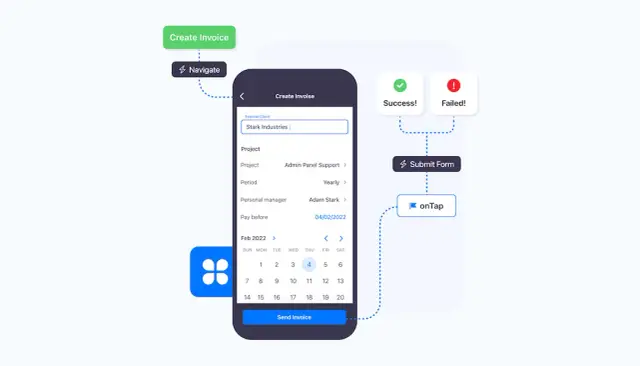The Role of APIs in Web Development
Explore the role of APIs in web development, their benefits, drawbacks, and security aspects, while also discovering how no-code platforms like AppMaster.io empower development processes.

The digital world is now more interconnected than ever, with software systems conversing across multiple platforms and devices. The underlying technologies that power this massive communication network may seem complex, but they all draw upon a relatively simple foundation: APIs, or Application Programming Interfaces. APIs bring efficiency, speed, and versatility to modern web development, facilitating the exchange of information between applications to unlock new functionalities and opportunities for collaboration.
In this article, we will explore the concept of APIs, understand their importance in web development, and discuss their advantages and disadvantages. By gaining a deeper understanding of APIs, you will be better equipped to harness their power and build more sophisticated web applications. Let's start by defining what an API is.
What is an API?
An API, or Application Programming Interface, is a set of rules, protocols, and tools that enable different software applications to communicate with one another. In simplest terms, it serves as an intermediary that allows two software components to exchange information and share functionality without sharing their source code or internal workings. APIs define the methods through which requests can be made, the data formats that should be used, and the conventions to follow while interconnecting applications. They help software developers access and integrate functionality provided by third-party services or other applications within their own applications.
To better visualize this, consider an API as a waiter in a restaurant. When a customer (application) wants to place an order (request), the waiter (API) takes the order and communicates it to the kitchen (another application), which prepares the food (data or functionality). The waiter (API) then serves the prepared meal (response) to the customer (application).
APIs have become critical components for web development, as they help developers easily access functionalities and services that can enhance their applications' user experience and drive seamless integration with other systems and applications.
Why Are APIs Important in Web Development?
APIs play a crucial role in modern web development, simplifying the process of creating feature-rich applications that interact with multiple services and systems. Here are some reasons why APIs are indispensable for web development:
- Streamlined Communication: APIs enable easy and standardized communication between different software components, regardless of the underlying technology they've been built upon. By providing a common interface and a clear set of rules for different software components to communicate, APIs ensure seamless integration and help developers build more powerful applications.
- Rapid Development and Integration: With APIs, developers no longer need to write code from scratch for every feature that their application needs. Instead, they can leverage existing APIs provided by third-party services or other applications to access specific functionalities, significantly speeding up development processes. This also simplifies the integration of external services like email, payment gateways, and social media platforms into web applications, enabling developers to offer a wide array of features and give users a seamless experience.
- Fosters Collaboration: APIs make it easier for developers from different teams or organizations to work together on a project. By providing a common language and a set of rules for connecting different software components, APIs enable developers to collaborate more efficiently, which is particularly essential in an era where remote work prevails.
- Enhanced User Experience: APIs enable web applications to provide users with a seamless and comprehensive experience. With APIs, users can access various features and functionalities without leaving the web application, streamlining their experience and making it more enjoyable and engaging.

Overall, APIs have become the backbone of modern web development, powering everything from single-page applications to complex enterprise systems. By leveraging APIs strategically, developers can create secure, versatile, and efficient web applications that provide users with unparalleled experiences.
Benefits of Utilizing APIs in Web Development
Utilizing APIs in web development provides numerous advantages that can streamline the development process and improve application functionality. Here are some of the key benefits:
-
Faster development: Leveraging APIs allows developers to access pre-built functionality and features provided by third-party services. This speeds up development, as there is no need to reinvent the wheel or write complex code to develop similar features from scratch.
-
Cost savings: By using APIs, developers can save time and resources that would otherwise be spent on building and maintaining custom integrations. This leads to reduced development costs and ultimately translates into financial savings.
-
Scalability: APIs enable developers to build web applications that are easier to scale. By utilizing existing functionality and services provided by third parties, developers can focus on building core features, ensuring their applications can grow seamlessly as user demands increase.
-
Modular architecture: APIs facilitate a modular architecture, which makes it easier to maintain, update, and extend web applications. When properly designed, APIs separate the concerns of different software components, promoting better organization and ensuring a smooth development process.
-
Improved performance: APIs can significantly improve the performance of web applications by offloading resource-intensive tasks to third-party services. This can help reduce server load and enhance user experience.
Drawbacks of Using APIs
Despite the numerous advantages, there are some potential drawbacks to using APIs in web development. It is essential to understand and address these challenges to ensure a successful implementation:
- Reliance on third-party services: The use of APIs could make web applications dependent on third-party services, which could pose risks in terms of reliability, stability, and availability. If the third-party service experiences downtime or discontinues its offering, the application could be severely impacted.
- Reduced control: While APIs offer access to pre-built functionality, developers give up a certain level of control over their applications. They have to adhere to the rules set by the API provider and may face limitations in customization options.
- Security risks: Introducing external APIs can expose web applications to potential security vulnerabilities. Developers must ensure that the APIs they use are secure and continually updated to protect against attacks.
- Performance issues: While APIs can improve performance, they can also introduce potential latency or bottlenecks if not carefully managed. Developers need to monitor and optimize API usage to mitigate performance issues.
API Security Considerations
Security should be a top priority when integrating APIs into web applications. To mitigate risks and ensure a secure application, consider the following best practices in API security:
Authentication and authorization
Implement strong authentication and authorization mechanisms to protect your API from unauthorized access. Use established standards such as OAuth 2.0 and OpenID Connect.
Data encryption
Ensure all data transmitted between your web application and the API is encrypted using Transport Layer Security (TLS) to protect against data breaches and interception.
Rate limiting
Implement rate limiting to prevent abuse and malicious usage of your APIs. This helps in maintaining performance and stability for legitimate users while limiting the potential impact of denial-of-service attacks.
Monitoring and logging
Regularly monitor API usage and log all requests to identify suspicious activity and potential security threats. Use analytics tools to analyze usage patterns and detect anomalies.
Regular updates and testing
Keep your APIs up-to-date with the latest security patches, and perform regular security testing to identify and address potential vulnerabilities.
By carefully considering these security best practices, developers can minimize the risks associated with using APIs in web development and build applications that are both functional and secure.
Best Practices for Implementing APIs
The effectiveness of an API relies heavily on its implementation. To ensure a seamless integration and optimal performance, it's essential to follow best practices when designing and implementing APIs. Here are some valuable recommendations:
- Utilize Standard Protocols and Patterns: Adopting widely-used standards such as REST and GraphQL ensures compatibility with various platforms and streamlines integration. Following consistent naming conventions, using standardized status codes, and employing resource-based URLs in RESTful APIs makes your API more intuitive for developers to understand and use.
- Design for Failure: Anticipate possible issues and develop strategies to handle failures gracefully. Implement error handling mechanisms, such as retry policies, circuit breakers, and fallbacks to maintain seamless usability even when external systems or components malfunction.
- Versioning: Implement proper versioning to enable smooth upgrades and adapt to changes without affecting the existing implementation. Use URL-based or parameter-based versioning schemes to communicate revisions to your API users without breaking their code.
- Comprehensive Documentation: Nurture a developer-friendly environment by preparing detailed documentation that covers every aspect of your API. It should outline the resources, methods, input parameters, expected outputs, and error handling processes. Comprehensive documentation aids developers in integrating your API, reducing the risks of miscommunication, and easing maintenance efforts.
- Secure Your API: Protecting sensitive information should be among your top priorities. Utilize secure authentication and authorization methods like OAuth to limit access to your API. Implement encryption to ensure data confidentiality and integrity. Employ rate limiting to prevent abuse and ensure fair resource usage among consumers.
- Monitor and Analyze API Usage: Regularly tracking API performance, usage patterns, and error rates allows you to identify potential bottlenecks, security vulnerabilities, and areas for optimization. Effective monitoring helps to maintain a high-quality API that meets the expectations of its consumers.
- Test Your API: Perform rigorous testing at each stage of API development, including unit, integration, and functional tests. Automated test suites ensure your API remains stable and reliable during upgrades and updates, mitigating disruptions to your users.
No-Code Platforms and APIs
In the era of rapid application development, no-code platforms have taken center stage. They empower developers and non-developers alike to build applications quickly and efficiently without writing complex code. A substantial aspect of their significance is their ability to integrate seamlessly with APIs, dramatically enhancing the capabilities and value of the applications they create.
AppMaster.io is a powerful no-code platform for creating backend, web, and mobile applications. It enables users to design data models, business logic, REST API and WSS endpoints, and UI components for web and mobile through an intuitive visual interface. This no-code approach dramatically accelerates the development process and allows for more cost-effective solutions.

AppMaster.io effortlessly integrates APIs with its visual editors, eliminating the need for writing complex code and lowering the barrier to entry for novice developers. This seamless integration with other services fuels rapid development of comprehensive, scalable software solutions that include server backends, websites, customer portals, and native mobile applications.
The AppMaster.io platform’s approach to APIs not only streamlines development but also improves collaboration among team members, fostering increased efficiency. Moreover, AppMaster.io regenerates applications from scratch whenever requirements change, eliminating technical debt and ensuring applications maintain their scalability and adaptability.
Conclusion
APIs have become a prominent component of modern web development, and understanding their role, advantages, and potential pitfalls is crucial for delivering scalable, versatile web applications. They enable efficient communication between software components, unlock rapid development and seamless integration, and empower organizations to create more diverse, powerful applications.
No-code platforms like AppMaster.io elevate this potential by providing seamless API integration with minimal coding and unlocking faster, more efficient application development processes. By understanding the capabilities of APIs, adopting best practices for implementation, and leveraging no-code platforms to simplify API integration, developers can cultivate more powerful, adaptable software solutions that drive innovation in the digital world.
FAQ
An API (Application Programming Interface) is a set of rules and protocols that enables communication between different software applications. It helps developers integrate functionality provided by third-party services into their own applications with ease.
APIs are important in web development because they simplify communication between different software components, allow for rapid integration, foster collaboration, and enable seamless user experiences. They make web apps more powerful and versatile.
Benefits of using APIs in web development include: faster development, easy integration, cost savings, scalability, modular architecture, improved performance, and better collaboration among developers.
Drawbacks of using APIs include potential reliance on third-party services, reduced control, security risks, and possible performance issues.
To manage API security, follow best practices such as using proper authentication and authorization mechanisms, encrypting data, implementing rate limiting, monitoring for suspicious activity, and regularly updating and testing APIs.
Best practices for implementing APIs include using standard protocols and patterns, designing for failure, versioning, proper documentation, and following security guidelines. Additionally, monitoring and analyzing API usage is crucial for optimization and maintenance purposes.
No-code platforms like AppMaster.io allow developers to effortlessly integrate APIs through visual editors, reducing the need for writing complex code. This leads to seamless integration with other services and fosters fast, efficient web development.
AppMaster.io is a powerful no-code platform that enables users to create backend, web, and mobile applications visually. It helps streamline the process of building software solutions and eliminates technical debt by regenerating applications from scratch whenever requirements change.





